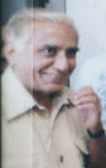Amir Jamal
| Amir H. Jamal | |
|---|---|
| આમિર જમાલ | |
 |
|
| Permanent Representative of Tanzania to the United Nations Office at Geneva | |
|
In office 1985–1993 |
|
| Appointed by | Ali Hassan Mwinyi |
| 2nd Minister of Finance | |
|
In office 1979–1983 |
|
| Preceded by | Edwin Mtei |
| Succeeded by | Kighoma Malima |
|
In office 1975–1977 |
|
| Preceded by | Cleopa Msuya |
| Succeeded by | Edwin Mtei |
|
In office 1965–1972 |
|
| Preceded by | Paul Bomani |
| Succeeded by | Cleopa Msuya |
| Member of Parliament for Morogoro |
|
|
In office 1960–1985 |
|
| Succeeded by | Shamim Khan |
| Personal details | |
| Born |
26 January 1922 Dar es salaam, Tanganyika |
| Died | 21 March 1995 (aged 73) Vancouver, British Columbia, Canada |
| Nationality | Tanzanian |
| Political party |
CCM TANU (1962–1977) |
| Spouse(s) | Zainy Kheraj Shahsultan Cassam |
| Children | 4 |
| Alma mater | University of Calcutta (BCom) |
| Ethnicity | Indian (Khoja) |
Amir Habib Jamal (26 January 1922 – 21 March 1995) was a Tanzanian politician and diplomat who served as a Minister under various portfolios in the Julius Nyerere administration. He represented the parliamentary constituency of Morogoro from 1960 to 1985, and was Tanzania's longest-serving Finance Minister and led the ministry for about 12 years.
Jamal was born in British administered Tanganyika, which was at the time a League of Nations mandate. He was born to Gujarati parents of Indian ancestry. He was the son of Kulsum Thawer and Habib Jamal, a founding member of the Asian Association. He was educated in his hometown of Mwanza and pursued his secondary education in Dar es Salaam. He graduated from the University of Calcutta in India with a BCom in economics.
He had intended to train as a doctor at the University of Bombay but despite his high marks, he didn't get into the medical faculty. In 1942, he attended a meeting of the Indian National Congress where Mahatma Gandhi launched the Quit India Movement, demanding the immediate withdrawal of the British from India. Upon graduation, he returned to Dar es Salaam and joined the family business.
He first met Julius Nyerere in 1952 at a reception hosted by the British Council in honour of the latter's return as a graduate of Edinburgh University. He was a veteran of Tanganyika's independence movement and in 1955, "helped to pay for Nyerere's visit to the United Nations" in New York City, USA.
...
Wikipedia
